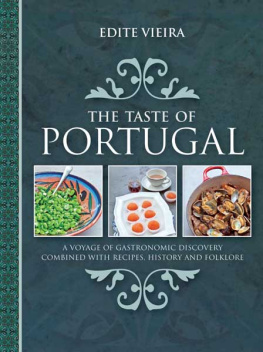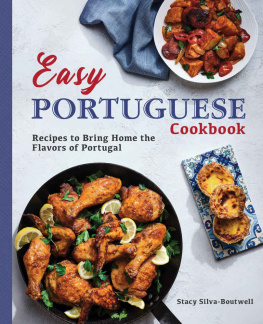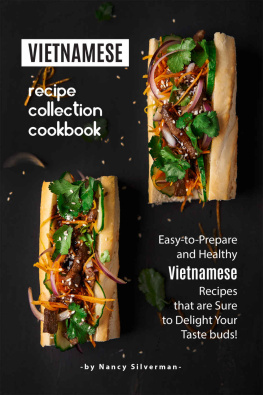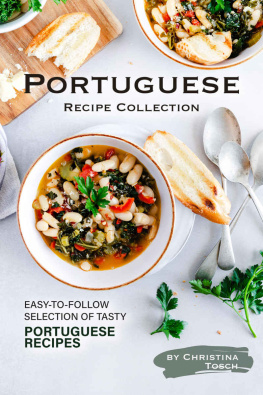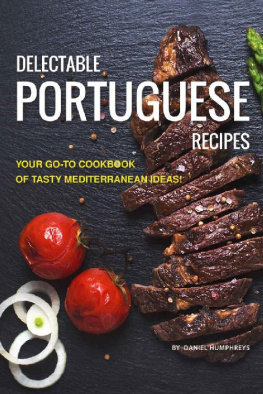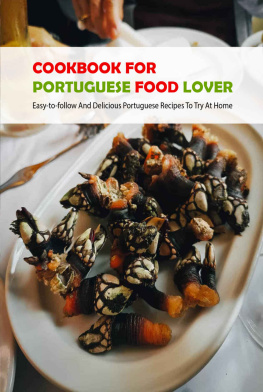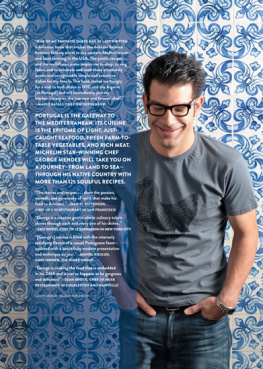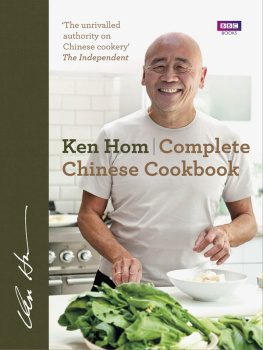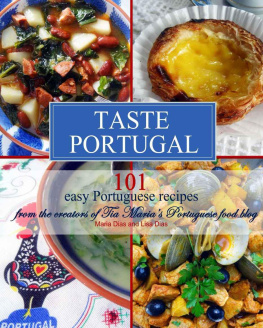
To Diana and Paul
This new edition published in 2013
by Grub Street
4 Rainham Close
London SW11 6SS
www.grubstreet.co.uk
email: food
Twitter: @grub_street
Text copyright Edite Vieira 1995, 2000, 2013
Copyright this new edition Grub Street 2013
Design: Sarah Driver
Photography: Michelle Garrett
Food Styling: Jayne Cross
The moral right of the author has been asserted
A CIP record for this title is available from the British Library
ISBN 978-1-908117-40-3
eISBN 978-1-910690-72-7
All rights reserved. No part of this publication may be reproduced, stored in a retrieval system, or transmitted in any form or by any means, electronic, mechanical, photocopying, recording or otherwise, without the prior permission of the copyright owner.
Printed and bound by MPG Ltd, Bodmin, Cornwall on FSC (Forest Stewardship Council) paper
CONTENTS

PREFACE
This 5th edition of The Taste of Portugal sees its return to a hardback format, due to Grub Streets confidence in it after its previous editions and many reprints. So thank you, Anne Dolamore. Acknowledgements, Foreword and Preface written previously, are still maintained, because they are relevant to this books journey. In the same way, I make no apologies for my commitment to traditional examples of Portuguese food and products (although I did revise and update the text throughout), because they constitute the basis of all things Portuguese and are the hallmark of my countrys perhaps stubborn individuality. You can deviate a little here and there, when you find it difficult to get hold of some specific ingredient. But do nag your suppliers. If there is enough demand, they will try to oblige.
Fortunately, Portuguese shops do exist in many countries. Keep looking. I have thought about this problem and offer a few ideas (see ), but remain convinced that, with just a bit of enterprise, it will be possible to eat Portuguese-style in most places. Or almost Recreate typical, rustic combinations, such as my favourite one, made of garlic, coriander (cilantro), olive oil and some salt, well pounded together, and youll be half-way there. These are basic, addictive, wonderful flavours that characterize Portugal. Enjoy them.
Edite Vieira
2012
PREFACE AND FOREWORD TO PREVIOUS EDITIONS
The Taste of Portugal is now in its 4th edition and I must first of all mention my Publishers, Grub Street, who very kindly took up the 3rd edition and, as much has happened in the years since the first edition, have invited me to revise it. To this end, I am indebted to the goodwill of Dr. Antnio Silva, Dr. Mrio Azevedo Ferreira, Lus Avides, Ruy Oliveira e Silva, Jos Arago and Sue Glasgow, from the ICEP (Portuguese Trade and Tourism Office) and IVP (Port Wine Institute) as well as ICEP officials in Portugal, such as Mr. Francisco Moro Correia, who enabled me to visit some Portuguese regions in order to update myself and therefore the book. I am also grateful to Hotel Altis in Lisbon (through Sofia Nobre) and various other kind people who have assisted me along the way, now and in the past, such as (and especially) Maria Antnia de Vasconcelos, Chief Editor of Readers Digest in Portugal, my Publishers Maria Rolim Ramos (from Colares Editora) and Francisco Espadinha (from Editorial Presena), Eugnio Lisboa, the Ambassador Joo Hall-Themido, Prof. Lus de Sousa Rebelo, Maria Adosinda Torgal Ferreira and many others, including my children Diana and Paul, and my late Mother.
However, I must not forget that without my first Publisher this particular book would simply not have happened. It was in fact Martin Kendall, one of the Directors of Hale Publishers, who first realised that a book on Portuguese gastronomy (which he relishes) had been long overdue and diligently set out to finding somebody to write one. It took him some doing and a bit of lateral thinking but in the end he found me and eventually the book was published, in 1988. To set the record straight, this is really how it all started. So I take this opportunity to acknowledge my first Publisher, as well as my latest, and to thank everybody for trusting me.
And now, thanks aside (with apologies to those who have not been mentioned) let us all celebrate by eating Portuguese style!
Authors Preface to the 4th Edition
It is most rewarding that this book is now entering its 4th edition. After all, it concerns a cuisine which is not very influential in Britain, like the French, Italian or Oriental cuisines are.
When the book was first published, in 1988, the now popular phrase Mediterranean diet had yet to be coined and cooking with lots of garlic, olive oil, wine, fresh coriander and heavens! salt cod, was still a bit frowned upon. Of course such ingredients did exist on sale, even then, if one cared to look for them in ethnic shops. However, they have now come out of the closet for good and their flavours are becoming more and more acceptable to British palates.
At the time, I was quite worried about the effect chemicals might have on agriculture and also about the many laws emanating from the EU, which, at a certain point, seemed to threaten the very existence of small holdings and the variety of traditional products such as cheeses like goats and ewes, which are such a blessing in Portugal and other countries. I am so glad that, meanwhile, these trends are receding, thanks to brave people who have and are tackling them. What a marvel it is to witness the return to organic methods and farmers markets and see products such as cheese, wine and olive oil actually being developed as never before.
I include in the book some background information on Portugal (some customs, a few snippets of history and so on) to enhance and, as it were, frame the subject, so that the reader may have some idea of the setting in which the dishes were created. So even if you do not dash immediately into the kitchen to cook Portuguese style, I hope the book will provide a good read.
Until quite recently I thought that reading cookery books was just a mania of mine, but I have now discovered that many people use them even as bed-time reading matter. I would, however, prefer that you use this book not so much as a sleeping-pill as a guide for cooking.
When preparing Portuguese dishes I am, mainly, matando saudades of Portuguese food. Those who understand Portuguese will know that saudade is something like nostalgia, but somehow not quite the same and very difficult to define, and that the Portuguese are forever referring to saudades, meaning they miss this or that, or someone, most desperately. To relieve this painful feeling they must matar saudades (matar means to kill, hence to kill that deep nostalgia) by doing whatever is needed for the purpose. In this case cooking.
I remember that when my children were small (after we came to live in London) they were always eager for their meals. For a while I wasnt working and had plenty of time for the kitchen, and they were delighted with my cooking. In their innocence they said once that surely the Queen of England did not have on her table such good food as we did. It is always a pleasure to prepare them such typical dishes as caldo verde (green broth), fatias douradas (golden slices), rice pudding and other delicious everyday Portuguese dishes. And they beg me to prepare my soups, each time they come home for a visit.
I used to take for granted the food I grew up with. It was only when I left Portugal, first to live in Africa, then in Spain and afterwards in Britain, that I began to realize how wonderful my childhood meals really had been and how much effort and care my mother lavished on the food she prepared for the family, day in and day out. Christmas, especially, was always something I longed for, as a child, partly because of the magnificent fried turnovers
Next page
